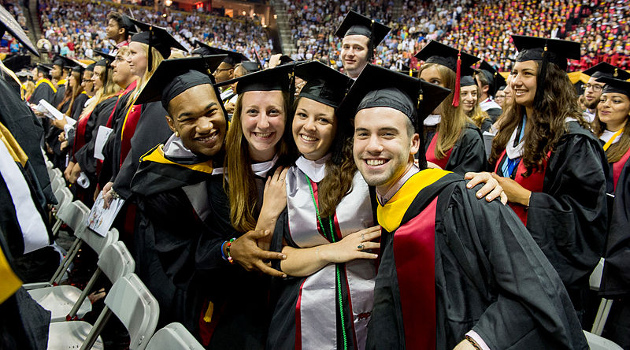It is very common for politicians to cause a problem with government intervention and then use the problem as an excuse for even bigger government.
I call this the lather-rinse-repeat cycle of government failure.
And the current controversy over student loan forgiveness is a perfect example.
- Politicians decided to subsidize student loans.
- Colleges and universities predictably responded by increasing tuition so they could grab this additional money.
- Politicians are now responding to the government-created crisis by pushing loan forgiveness.
I could write a column about how this will make a bad situation worse. Heck, I already have written that column. Several times.
But I want to focus today on a different aspect of this issue.
Biden on his allies in Congress are pushing a policy that will redistribute money from lower-income people to higher-income people.
Let’s look at some of the findings of a new study by Professor Sylvain Catherine at the University of Pennsylvania and Professor Constantine Yannelis at the University of Chicago.
…on average, those who graduate with a post-secondary degree earn more than those who do not, so student debt forgiveness plans, by definition, are geared toward higher-wage earners. Further, many holders of high loan balances completed graduate and professional degrees and thus earn even higher incomes. …universal debt forgiveness policies would disproportionately benefit high earners. …universal and capped forgiveness policies are highly regressive, with the vast majority of benefits accruing to high-income individuals.
Peter Suderman of Reason is unimpressed by this backwards form of redistribution.
The single largest source of student loan debt is MBA programs, as Brookings Institution Senior Fellow Adam Looney has noted, and MBA grads average more than $73,000 in earnings their first year out of school. “The five degrees responsible for the most student debt are: MBA, JD, BA in business, BS in nursing, and MD,” Looney wrote in 2020. “That’s one reason why the top 20 percent of earners owe 35 percent of the debt, and why most debt is owed by well-educated individuals.” Technically, it’s true that well-paid professional school graduates fall into the category of “working people.” But..what Biden appears to be considering, is a massive program of government aid that would disproportionately benefit doctors, lawyers, well-paid medical specialists, and comfortably salaried individuals with advanced business degrees. …a trillion-dollar bailout for the upper-middle class.
This is disgusting and reprehensible.
I don’t think it is a proper role of the federal government to redistribute money. But it is especially grotesque and misguided when politicians use the coercive power of government to shift resources from lower-income Americans to higher-income Americans.
For what it is worth, there already are many policies and programs in Washington that – on net – shift money from the poor to the rich.
- Export-Import Bank
- Agriculture subsidies
- National Endowment for the Arts
- Deduction for mortgage interest
- Tax exemption for municipal bonds
I will close by observing that there has also been a vigorous effort from our friends on the left to restore an unlimited deduction for state and local taxes.
It’s almost as if it is okay to have policies that benefit rich people, so long as they mostly live in blue states.
P.S. It is possible to design loan forgiveness to reduce the level of poor-to-rich redistribution. The aforementioned study by Professors Catherine and Yannelis includes data showing how various income deciles will (or will not) benefit depending on different types of forgiveness rules.
P.P.S. However, any type of loan forgiveness exacerbates the original problem, which is how politicians have enabled and subsidized ever-higher tuition rates.
———
Image credit: Maryland GovPics | CC BY 2.0.





